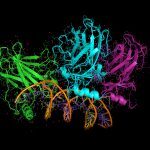Lien vers Pubmed [PMID] – 34006648
Lien DOI – e00519-2110.1128/mBio.00519-21
mBio 2021 May; 12(3):
Cell growth and division require a balance between synthesis and hydrolysis of the peptidoglycan (PG). Inhibition of PG synthesis or uncontrolled PG hydrolysis can be lethal for the cells, making it imperative to control peptidoglycan hydrolase (PGH) activity. The synthesis or activity of several key enzymes along the PG biosynthetic pathway is controlled by the Hanks-type serine/threonine kinases (STKs). In Gram-positive bacteria, inactivation of genes encoding STKs is associated with a range of phenotypes, including cell division defects and changes in cell wall metabolism, but only a few kinase substrates and associated mechanisms have been identified. We previously demonstrated that STK-PrkC plays an important role in cell division, cell wall metabolism, and resistance to antimicrobial compounds in the human enteropathogen Clostridioides difficile In this work, we characterized a PG hydrolase, CwlA, which belongs to the NlpC/P60 family of endopeptidases and hydrolyses cross-linked PG between daughter cells to allow cell separation. We identified CwlA as the first PrkC substrate in C. difficile We demonstrated that PrkC-dependent phosphorylation inhibits CwlA export, thereby controlling hydrolytic activity in the cell wall. High levels of CwlA at the cell surface led to cell elongation, whereas low levels caused cell separation defects. Thus, we provided evidence that the STK signaling pathway regulates PGH homeostasis to precisely control PG hydrolysis during cell division.IMPORTANCE Bacterial cells are encased in a PG exoskeleton that helps to maintain cell shape and confers physical protection. To allow bacterial growth and cell separation, PG needs to be continuously remodeled by hydrolytic enzymes that cleave PG at critical sites. How these enzymes are regulated remains poorly understood. We identify a new PG hydrolase involved in cell division, CwlA, in the enteropathogen C. difficile Lack or accumulation of CwlA at the bacterial surface is responsible for a division defect, while its accumulation in the absence of PrkC also increases susceptibility to antimicrobial compounds targeting the cell wall. CwlA is a substrate of the kinase PrkC in C. difficile PrkC-dependent phosphorylation controls the export of CwlA, modulating its levels and, consequently, its activity in the cell wall. This work provides a novel regulatory mechanism by STK in tightly controlling protein export.









